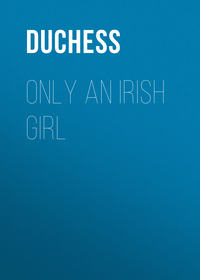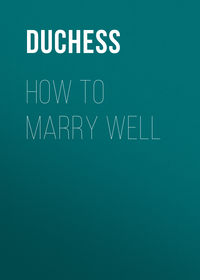 полная версия
полная версияMrs. Geoffrey
The description is graphic, certainly.
"Is – is Violet Mansergh a pretty girl?" asks Mona, grasping instinctively at the fact that any one called Violet Mansergh may be a possible rival.
"Pretty? No. But she dresses very swagger, and always looks nice, and is generally correct all through," replies Mr. Rodney, easily.
"I know," says Mona, sadly.
"She's the girl my mother wanted me to marry, you know," goes on Rodney, unobservant, as men always are, of the small signals of distress hung out by his companion.
"Oh, indeed!" says Mona; and then, with downcast eyes, "but I don't know, because you never told me before."
"I thought I did," says Geoffrey, waking slowly to a sense of the situation.
"Well, you didn't," says Mona. "Are you engaged to her?"
"If I was, how could I ask you to marry me?" returns he, in a tone so hurt that she grows abashed.
"I hope she isn't in love with you," she says, slowly.
"You may bet anything you like on that," says Geoffrey, cheerfully. "She cares for me just about as much as I care for her, – which means exactly nothing."
"I am very glad," says Mona, in a low tone.
"Why, Mona?"
"Because I could not bear to think any one was made unhappy by me. It would seem as though some evil eye was resting on our love," says Mona, raising her thoughtful, earnest eyes to his. "It must be a sad thing when our happiness causes the misery of others."
"Yet even were it so you would love me, Mona?"
"I shall always love you," says the girl, with sweet seriousness, "better than my life. But in that case I should always, too have a regret."
"There is no need for regret, darling," says he. "I am heart-whole, and I know no woman that loves me, or for whose affection I should ask, except yourself."
"I am indeed dear to you, I think," says Mona, softly and thankfully, growing a little pale through the intensity of her emotion.
"'Perdition catch my soul, but I do love thee,'" replies he, quite as softly.
Then she is pleased, and slips her hand into his, and goes along the quiet road, beside him with a heart in which high jubilee holds sway.
"Now tell me something else," she says, after a little bit. "Do all the women you know dress a great deal?"
"Some of them; not all. I know a considerable few who dress so little that they might as well leave it alone."
"Eh?" says Mona, innocently, and stares at him with an expression so full of bewilderment, being puzzled by his tone more than his words, that presently Mr. Rodney becomes conscious of a feeling akin to shame. Some remembrance of a line that speaks of "a soul as white as heaven" comes to him, and he makes haste to hide the real meaning of his words.
"I mean, some of them dress uncommon badly," he says, with much mendacity and more bad grammar.
"Now, do they?" says Mona. "I thought they always wore lovely clothes. In books they always do; but I was too young when with Aunt Anastasia in Dublin to go out. Somehow, what one imagines is sure to be wrong. I remember," laughing, "when I firmly believed the queen never was seen without her crown on her head."
"Well, it always is on her head," says Mr. Rodney, at which ridiculous joke they both laugh as gayly as though it were a bon-mot of the first water. That "life is thorny, and youth is vain" has not as yet occurred to either of these two. Nay, more, were you even to name this thought to them, they would rank it as flat blasphemy, and you a false prophet – love and laughter being, up to this, the burden of their song.
Yet after a moment or two the smile fades from Mona's mobile lip that ever looks as if, in the words of the old song, "some bee had stung it newly," and a pensive expression takes its place.
"I think I'd like to see myself in a regular evening gown," she say, wistfully.
"So should I," says Rodney, eagerly, but incorrectly; "at least, not myself, but you, – in something handsome, you know, open at the neck, and with your pretty arms bare, as they were the first day I saw you."
"How you remember that, now!" says Mona, with a heavenly smile, and a faint pressure of the fingers that still rest in his. "Yes, I should like to be sure before I marry you that – that – fashionable clothes would become me. But of course," regretfully, "you will understand I haven't a gown of that sort. I once sat in Lady Crighton's room while her maid dressed her for dinner: so I know all about it."
She sighs, then looks at the sky, and – sighs again.
"And do you know," she says, with charming naivete, not looking at him, but biting a blade of grass in a distractingly pretty and somewhat pensive fashion, "do you know her neck and arms are not a patch on mine?"
"You needn't tell me that. I'm positive they couldn't be named in the same day," says Geoffrey, enthusiastically, who never in his life saw Lady Crighton, or her neck or arms.
"No, they are not. Geoffrey, people look much better when they are beautifully dressed, don't they?"
"Well, on the principle that fine feathers make fine birds, I suppose they do," acknowledges Geoffrey, reluctantly.
At this she glances with scorn upon the quakerish and somewhat quaint gray gown in which she is clothed, and in which she is looking far sweeter than she knows, for in her face lie "love enshrined and sweet attractive grace."
"Yet, in spite of all the fine feathers, no one ever crept into my heart but my own Mona," says the young man, putting his hand beneath her chin, which is soft and rounded as a baby's, and turning her face to his. He hates to see the faint chagrin that lingers on it for a moment; for his is one of those tender natures that cannot bear to see the thing it loves endure the smallest torment.
"Some women in the great world overdo it," he goes on, "and choose things and colors utterly unsuited to their style. They are slaves to fashion. But
"'My love in her attire doth show her wit;It doth so well become her.'""Ah, how you flatter!" says Mona. Nevertheless, being a woman, and the flattery being directed to herself, she takes it kindly.
"No, you must not think that. To wear anything that becomes you must be the perfection of dressing. Why wear a Tam O'Shanter hat when one looks hideous in it? And then too much study spoils effect: you know what Herrick says: —
"'A careless shoe-string in whose tieI see a wild civility,Does more bewitch me than when artIs too precise in every part.'""How pretty that is! Yet I should like you to see me, if only for once, as you have seen others," says Mona.
"I should like it too. And it could be managed, couldn't it? I suppose I could get you a dress."
He says this quickly, yet fearfully. If she should take his proposal badly, what shall he do? He stares with flattering persistency upon a distant donkey that adorns a neighboring field, and calmly awaits fate. It is for once kind to him. Mona, it is quite evident, fails to see any impropriety in his speech.
"Could you?" she says hopefully. "How?"
Mr. Rodney, basely forsaking the donkey, returns to his mutton. "There must be a dressmaker in Dublin," he says, "and we could write to her. Don't you know one?"
"I don't, but I know Lady Mary and Miss Blake always get their things from a woman called Manning."
"Then Manning it shall be," says Geoffrey, gayly. "I'll run up to Dublin, and if you give me your measure I'll bring a gown back to you."
"Oh, no, don't," says Mona, earnestly. Then she stops short, and blushes a faint sweet crimson.
"But why?" demands he, dense as men will be at times. Then, as she refuses to enlighten his ignorance, slowly the truth dawns upon him.
"Do you mean that you would really miss me if I left you for only one day?" he asks, delightedly. "Mona, tell me the truth."
"Well, then, sure you know I would," confesses she, shyly but honestly. Whereupon rapture ensues that lasts for a full minute.
"Very well, then; I shan't leave you; but you shall have that dress all the same," he says. "How shall we arrange about it?"
"I can give you the size of my waist and my shoulders, and my length," says Mona, thoughtfully, yet with a touch of inspiration.
"And what color becomes you? Blue? that would suit your eyes, and it was blue you used to wear last month."
"Yes, blue looks very nice on me. Geoffrey, if Uncle Brian hears of this, will he be angry?"
"We needn't risk it. And it is no harm, darling, because you will soon be my wife, and then I shall give you everything. When the dress comes I'll send it up to you by my man, and you must manage the rest."
"I'll see about it. And, oh, Geoffrey, I do hope you will like me in it, and think me pretty," she says, anxiously, half fearful of this gown that is meant to transform a "beggar maid" into a queen fit for "King Cophetua." At least such is her reading of the part before her.
And so it is arranged. And that evening Geoffrey indites a letter to Mrs. Manning, Grafton Street, Dublin, that brings a smile to the lips of that cunning modiste.
CHAPTER IX
HOW GEOFFREY AND MONA DILIGENTLY WORK UP THE TRANSFORMATION SCENE; AND HOW SUCCESS CROWNS THEIR EFFORTS
In due course the wonderful gown arrives, and is made welcome at the farm, where Geoffrey too puts in an appearance about two hours later.
Mona is down at the gate waiting for him, evidently brimful of information.
"Well have you got it?" asks he, in a whisper. Mystery seems to encircle them and to make heavy the very air they breathe. In truth, I think it is the veil of secrecy that envelops their small intrigue that makes it so sweet to them. They might be children, so delighted are they with the success of their scheme.
"Yes, I have got it," also in a subdued whisper. "And, oh, Geoffrey, it is just too lovely! It's downright delicious; and satin, too! It must" – reproachfully – "have cost a great deal, and after all you told me about being poor! But," with a sudden change of tone, forgetting reproach and extravagance and everything, "it is exactly the color I love best, and what I have been dreaming of for years."
"Put it on you," says Geoffrey.
"What! now?" with some hesitation, yet plainly filled with an overwhelming desire to show herself to him without loss of time in the adorable gown. "If I should be seen! Well, never mind; I'll risk it. Go down to the little green glade in the wood, and I'll be with you before you can say Jack Robinson."
She disappears, and Geoffrey, obedient to orders, lounges off to the green glade, that now no longer owns rich coloring, but is strewn with leaves from the gaunt trees that stand in solemn order like grave sentries round it.
He might have invoked Jack Robinson a score of times had he so wished, he might even have gone for a very respectable walk, before his eyes are again gladdened by a sight of Mona. Minutes had given place to minutes many times, when, at length, a figure wrapped in a long cloak and with a light woollen shawl covering her head comes quickly towards him across the rustic bridge, and under the leafless trees to where he is standing.
Glancing round fearfully for a moment, as though desirous of making sure that no strange eyes are watching her movements, she lets the loose cloak fall to the ground, and, taking with careful haste the covering from her head, slips like Cinderella from her ordinary garments into all the glories of a fete gown. She steps a little to one side, and, throwing up her head with a faint touch of coquetry that sits very sweetly on her, glances triumphantly at Geoffrey, as though fully conscious that she is looking exquisite as a dream.
The dress is composed of satin of that peculiarly pale blue that in some side-lights appears as white. It is opened at the throat, and has no sleeves to speak of. As though some kindly fairy had indeed been at her beck and call, and had watched with careful eyes the cutting of the robe, it fits to a charm. Upon her head a little mob-cap, a very marvel of blue satin and old lace, rests lovingly, making still softer the soft tender face beneath it.
There is a sparkle in Mona's eyes, a slight severing of her lips, that bespeak satisfaction and betray her full of very innocent appreciation of her own beauty. She stands well back, with her head held proudly up, and with her hands lightly clasped before her. Her attitude is full of unstudied grace.
Her eyes, as I tell you, are shining like twin stars. Her whole soul is possessed of this hope, that he for whom almost she lives must think her good to look at. And good indeed she is, and very perfect; for in her earnest face lies such inward godliness and sweet trust as make one feel the better for only a bare glance at her.
Geoffrey is quite dumb, and stands gazing at her surprised at the amazing change a stuff, a color, can make in so short a time. Beautiful she always is in his sight, but he wonders that until now it never occurred to him what a sensation she is likely to create in the London world. When at last he does give way to speech, driven to break his curious silence by something in her face, he says nothing of the gown, but only this.
"Oh, Mona, will you always love me as you do now?"
His tone is full of sadness and longing, and something akin to fear. He has been much in the world, and has seen many of its evil ways, and this is the result of his knowledge. As he gazes on and wonders at her marvellous beauty, for an instant (a most unworthy instant) he distrusts her. Yet surely never was more groundless doubt sustained, as one might know to look upon her eyes and mouth, for in the one lies honest love, and in the other firmness.
Her face changes. He has made no mention of the treasured gown, has said no little word of praise.
"I have disappointed you," she says, tremulously, tears rising quickly. "I am a failure! I am not like the others."
"You are the most beautiful woman I ever saw in all my life," returns Rodney, with some passion.
"Then you are really pleased? I am just what you want me to be? Oh! how you frightened me!" says the girl, laying her hand upon her heart with a pretty gesture of relief.
"Don't ask me to flatter you. You will get plenty to do that by and by," says Geoffrey, rather jealously, rather bitterly.
"'By and by' I shall be your wife," says Mona, archly, "and then my days for receiving flattery will be at an end. Sure you needn't grudge me a few pretty words now."
What a world is to be opened up to her! How severe the test to which she will be exposed! Does she really think the whole earth is peopled with beings pure and perfect as herself?
"Yes, that is true," he says, in a curious tone, in answer to her words, his eyes fixed moodily upon the ground. Then suddenly he lifts his head, and as his gaze meets hers some of the truth and sweetness that belong to her springs from her to him and restores him once again to his proper self.
He smiles, and, turning, kneels before her in mock humility that savors of very real homage. Taking her hand, he presses it to his lips.
"Will your majesty deign to confer some slight sign of favor upon a very devoted servant?"
His looks betray his wish. And Mona, stooping, very willingly bestows upon him one of the sweetest little kisses imaginable.
"I doubt your queen lacks dignity," she says, with a quick blush, when she has achieved her tender crime.
"My queen lacks nothing," says Geoffrey. Then, as he feels the rising wind that is soughing through the barren trees, he says, hurriedly, "My darling, you will catch cold. Put on your wraps again."
"Just in one moment," says the wilful beauty. "But I must first look at myself altogether. I have only seen myself in little bits up to this, my glass is so small."
Running over to the river that flows swiftly but serenely a few yards from her, she leans over the bank and gazes down lingeringly and with love into the dark depths beneath that cast up to her her own fair image.
The place she has chosen as her mirror is a still pool fringed with drooping grasses and trailing ferns that make yet more dark the sanded floor of the stream.
"Yes, I am pretty," she says, after a minute's pause, with a long-drawn sigh of deepest satisfaction. Then she glances at Geoffrey. "And for your sake I am glad of it Now, come here and stand beside me," she goes on, presently, holding out her hand backwards as though loath to lose sight of her own reflection. "Let me see how you look in the water."
So he takes her hand, and together they lean over the brink and survey themselves in Nature's glass. Lightly their faces sway to and fro as the running water rushes across the pool, – sway, but do not part; they are always together, as though in anticipation of that happy time when their lives shall be one. It seems like a good omen; and Mona, in whose breast rests a little of the superstition that lies innate in every Irish heart, turns to her lover and looks at him.
He, too, looks at her. The same thought fills them both. As they are together there in the water, so (pray they) "may we be together in life." This hope is sweet almost to solemnity.
The short daylight fades; the wind grows higher; the whole scene is curious, and very nearly fantastical. The pretty girl in her clinging satin gown, and her gleaming neck and arms, bare and soft and white, and the tiny lace-fringed cap that crowns her fairness. The gaunt trees branching overhead that are showering down upon her all their fading wealth of orange and crimson and russet-colored leaves, that serve to throw out the glories of her dress. The brown-green sward is beneath her, the river runs with noiseless mirth beside her, rushing with faint music over sand and pebble to the ocean far below. Standing before her is her lover, gazing at her with adoring eyes.
Yet all things in this passing world know an end. In one short moment the perfect picture is spoiled. A huge black dog, bursting through the underwood, flings himself lovingly upon Mona, threatening every moment to destroy her toilet.
"It is Mr. Moore's retriever!" cries Mona, hurriedly, in a startled tone. "I must run. Down, Fan! down! Oh, if he catches me here, in this dress, what will he think? Quick, Geoffrey, give me my shawl!"
She tucks up her dignified train in a most undignified haste, while Geoffrey covers up all the finery with the crimson shawl. The white cloud is once more thrown over the dainty cap; all the pretty coloring vanishes out of sight; and Mona, after one last lingering glance at Geoffrey, follows its example. She, too, flies across the rural bridge into the covert of her own small domain.
It is over; the curtain is down; the charming transformation-scene has reached its end, and the fairy-queen doffing her radiant robes, descends once more to the level of a paltry mortal.
CHAPTER X
HOW MONA, GROWING INQUISITIVE, ASKS QUESTIONS; AND HOW GEOFFREY, BEING BROUGHT TO BAY, MAKES CONFESSIONS THAT BODE BUT EVIL TO HIS FUTURE PEACE, AND BREED IMMEDIATE WAR
"Oh! catch him! do catch him!" cries Mona, "Look, there he is again! Don't you see?" with growing excitement. "Over there, under that bush. Why on earth can't you see him? Ha! there he is again! Little wretch! Turn him back, Geoffrey; it is our last chance."
She has crossed the rustic bridge that leads into the Moore plantations, in hot pursuit of a young turkey that is evidently filled with a base determination to spend his Sunday out.
Geoffrey is rushing hither and thither, without his hat, and without his temper, in a vain endeavor to secure the rebel and reduce him to order. He is growing warm, and his breath is coming more quickly than is exactly desirable; but, being possessed with the desire to conquer or die, he still holds on. He races madly over the ground, crying "Shoo!" every now and then (whatever that may mean) in a desperate tone, as though impressed with the belief that this simple and apparently harmless expletive must cow the foe.
"Look at him, under that fern there!" exclaims Mona, in her clear treble, that has always something sweet and plaintive in it. "On your right – no! not on your left. Sure you know your right, don't you?" with a full, but unconscious, touch of scorn. "Hurry! hurry! or he will be gone again. Was there ever such a hateful bird! With his good food in the yard, and his warm house, and his mother crying for him! Ah! there you have him! No! – yes! no! He is gone again!"
"He isn't!" says Geoffrey, panting "I have him at last!" Whereupon he emerges from a wilderness of ferns, drawing after him and holding up triumphantly to the light the wandering bird, that looks more dead than alive, with all its feathers drooping, and its breath coming in angry cries.
"Oh, you have him!" says Mona, with a beaming smile, that is not reciprocated by the captured turkey. "Hold him tight: you have no idea how artful he is. Sure I knew you'd get him, if any one could!"
There is admiration blended with relief in her tone, and Geoffrey begins to feel like a hero of Waterloo.
"Now carry him over the bridge and put him down there, and he must go home, whether he likes it or not," goes on Mona to her warrior, whereupon that renowned person, armed with the shrieking turkey, crosses the bridge. Having gained the other side, he places the angry bird on its mother earth, and with a final and almost tender "Shoo!" sends him scuttling along to the farmyard in the distance, where, no doubt, he is received either with open arms and kisses, or with a sounding "spank," as our American cousins would say, by his terrified mamma.
He finds Mona on his return sitting on a bank, laughing and trying to recover her breath.
"I hardly think this is Sunday work," she says, lightly; "but the poor little thing would have died if left out all night. Wasn't it well you saw him?"
"Most fortunate," says Rodney, with deep gravity. "I consider I have been the means of preventing a public calamity. Why, that bird might have haunted us later on."
"Fancy a turkey ghost," says Mona. "How ugly it would be. It would have all its feathers off, of course."
"Certainly not," says Geoffrey: "I blush for you. I never yet heard of a ghost that was not strictly decent. It would have had a winding sheet, of course. Come, let us go for a walk."
"To the old fort?" asks Mona, starting to her feet.
"Anywhere you like. I'm sure we deserve some compensation for the awful sermon that curate gave us this morning."
So they start, in a lazy, happy-go-lucky fashion, for their walk, conversing as they go, of themselves principally as all true lovers will.
But the fort, on this evening at least, is never reached Mona, coming to a stile, seats himself comfortably on the top of it, and looks with mild content around.
"Are you going no farther?" asks Rodney, hoping sincerely she will say "No." She does say it.
"It is so nice here," she says, with a soft sigh, and a dreamy smile, whereupon he too climbs and seats himself beside her. As they are now situated, there is about half a yard between them of passable wall crowned with green sods, across which they can hold sweet converse with the utmost affability. The evening is fine; the heavens promise to be fair; the earth beneath is calm and full of silence as becomes a Sabbath eve; yet, alas! Mona strikes a chord that presently flings harmony to the winds.
"Tell me about your mother," she says, folding her hands easily in her lap. "I mean, – what is she like? Is she cold, or proud, or stand-off?" There is keen anxiety in her tone.
"Eh?" says Geoffrey, rather taken back. "Cold" and "proud" he cannot deny, even to himself, are words that suit his mother rather more than otherwise.
"I mean," says Mona, flushing a vivid scarlet, "is she stern?"
"Oh, no," says Geoffrey, hastily, recovering himself just in time; "she's all right, you know, my mother; and you'll like her awfully when – when you know her, and when – when she knows you."
"Will that take her long?" asks Mona, somewhat wistfully, feeling, without understanding, some want in his voice.
"I don't see how it could take any one long," says Rodney.
"Ah! that is because you are a man, and because you love me," says this astute reader of humanity. "But women are so different. Suppose – suppose she never gets to like me?"









